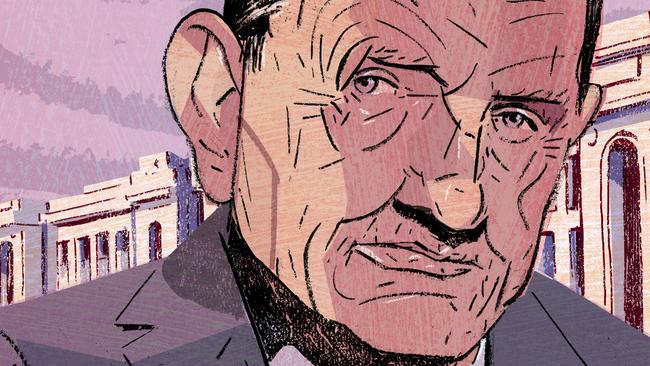
The political upheaval of the past decade does not compare with the ascendancy of John Gorton, who was elected Liberal leader 50 years ago today, his tumultuous prime ministership and dramatic departure from office three years later.
At 2.30pm on January 9, 1968, the Liberal Party met to select a new leader and, consequently, prime minister. The candidates were Gorton, Paul Hasluck, Billy Snedden and Les Bury. The result of the ballot was never announced but we reported that Gorton had defeated Hasluck by 51 to 30 in the second vote.
Gorton is the only senator to have become prime minister. He was sworn in at 2.40pm on January 10 by governor-general Richard Casey. He resigned from parliament on February 1 to contest the Melbourne seat of Higgins at a by-election held on February 24, and remained prime minister without a seat in parliament for more than three weeks.
On December 17, 1967, prime minister Harold Holt had gone missing while swimming at Cheviot Beach. John McEwen, the deputy prime minister and Country Party leader, manoeuvred to be sworn in as prime minister, taking the oath on December 19. He was to be a stopgap PM until the Liberals chose a new leader.
Gorton, then Senate leader, was not initially the frontrunner. The favourite was McMahon, the deputy Liberal leader and treasurer. But McEwen told Casey the Coalition would be torn up if McMahon became prime minister. It was a threat born of intense hatred for McMahon, fuelled by bitter policy disagreements. Yet the Liberals didn’t need the Country Party to form a majority in the House of Representatives.
The retired Robert Menzies favoured Hasluck, the minister for external affairs, and offered his support. McEwen also preferred Hasluck, but did not campaign for him. Malcolm Fraser, who organised for Gorton, told me Hasluck would have been a better PM.
Gorton wasted no time. He used the media, especially television, to press his case. It was the first time TV had such a dramatic impact on politics. McMahon was indignant at being blackballed by McEwen and refused to reveal whether he would stand for leader until the day of the ballot. By January 9, Gorton was the favourite and easily defeated Hasluck.
Gorton’s elevation was unprecedented. He described it as “awe-inspiring” and “a little overwhelming”. He was a wartime fighter pilot with a disfigured face and a somewhat scruffy appearance. He was seen as a likeable, straight-talking, dinky-di Australian. The voters liked his earthy larrikinism. His approval rating reached 64 per cent in April 1969.
Australia’s policy settings began to shift. There were important initiatives in economic development, education, health, social welfare, the environment and the arts. Gorton was neither enamoured with Britain nor overawed by the US; he was an Australian nationalist. He began withdrawing Australian troops from Vietnam.
But he was never acceptable to the Melbourne establishment. He was also on the outer in NSW, where McMahon’s relationship with the Packer dynasty spawned a run of poison-pen articles from journalist Alan Reid.
Gorton’s centralist policies, such as expanding federal powers over territorial waters and the continental shelf, enraged conservative premiers Henry Bolte (Victoria), Bob Askin (NSW) and Joh Bjelke-Petersen (Queensland).
Gorton wanted more authority in the prime ministership and occasionally announced policy without cabinet approval. He established a Prime Minister’s Department to boost policymaking capacity and appointed the highly intelligent and independently-minded Lenox Hewitt as its head. This sat uneasily with Canberra’s powerful mandarins. Another controversy involved the appointment of the 22-year-old Ainsley Gotto to run his office.
Gorton’s personal behaviour was unorthodox. He liked to be around women, enjoyed parties and drank too much. Minister Peter Nixon recalls Gorton sneaking out of the Lodge and jumping in the back seat of his car, lying down to get past the guards, to go to parties at night.
Journalist Mike Willesee remembers being invited to the Lodge and watching Gorton down many large glasses of scotch on a regular basis. Others recalled him drinking heavily in the morning.
At the October 1969 election, facing a Labor Party led by Gough Whitlam, the Gorton government lost 16 seats. It was the beginning of the end. The prime minster was on the nose. After the election, Gorton survived a leadership challenge from McMahon and David Fairbairn. At the November 1970 Senate election, the government lost two seats.
Tony Eggleton, Gorton’s press secretary, told me his old boss lacked the work ethic to be an effective prime minister. “He did like to be prime minister five days a week,” Eggleton says. “He wasn’t very good at managing things. John was inclined to put things off all the time. He wanted to do things his own way … he disappointed me.”
Gorton’s downfall, on March 10, 1971, was extraordinary. Two days earlier he had been denounced by Fraser, who had resigned from cabinet over a dispute concerning civil aid in Vietnam. He was beset by leaks from cabinet, most likely from McMahon, and faced a treacherous backbench. After a partyroom vote of confidence was tied 33-all, Gorton presumed to exercise a casting vote against himself, and resigned.
McMahon became the fifth prime minister in five years. (Bizarrely, Gorton became deputy Liberal leader and defence minister, but was sacked by McMahon for disunity on August 13, 1971.) Gorton was the first Liberal leader to face a leadership challenge and motion of confidence. And he was the first postwar prime minister to be felled by his partyroom.
Gorton gave voice to a new Australia emerging in the post-Menzies years and left office with several notable achievements. But he was unable to tame his larrikinism, lacked administrative discipline and could not maintain the trust of his party. Fifty years later, one of the enduring legacies is that Gorton’s rise and fall stands as a portent of our modern-day political instability



To join the conversation, please log in. Don't have an account? Register
Join the conversation, you are commenting as Logout